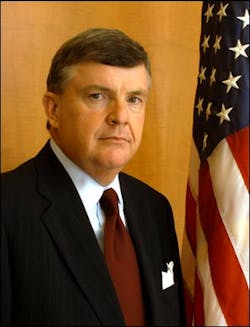Meet the FCC's Public Safety & Homeland Security Bureau Chief
On Sept. 25, 2006, the Federal Communications Commission (FCC) took a bold new step by establishing the Public Safety & Homeland Security Bureau. After the tragedies of September 11 and Hurricane Katrina, the FCC believed that a specific bureau should be developed to assist in the areas of homeland security and public safety.
This bureau is responsible for developing, recommending, and administering the agency's policies pertaining to public safety communications issues. These policies include 911 and E911, operability and interoperability of public safety communications, communications infrastructure protection and disaster response and network security and reliability.
The purpose of this article is to introduce you to Derek K. Poarch who is the first chief of the FCC's newly formed bureau. I had the opportunity to participate in the FCC's first public safety forum, listen to Chief Poarch speak at a number of national programs, meet him in person and conduct this interview. Chief Derek Poarch is a man that is highly motivated, dedicated, knowledgeable, and persuasive. His enthusiasm and sense of purpose is inspiring and contagious.
When asked about this new position, Chief Poarch described his new job as "dream" job that came at the right time. Chief Poarch had already served in a public safety capacity for over 30 years as Director of Public Safety and Chief of Police at the University of North Carolina at Chapel Hill.
Serving and living through September 11 and Hurricane Katrina, he knows what needs to be done and has set his sights high to get it done. Chief Poarch affirmed, "Interoperability in our work saves lives."
Chief Poarch said he thrives on change and this job is definitely facing what are considered the most significant changes in public safety communications in decades. Another of the chief's distinguishing traits that make his appointment particularly appropriate is his love of a fast paced and challenging environment. Chief Poarch finds his role as new and refreshing. Chief Poarch made it very clear and is very pleased in the relationships with the FCC Commissioners, public safety peers and staff. Poarch noted the most important element of success, "It's all about relationships." Chief Poarch emphasized that Chairman Martin and the other FCC Commissioners are engaged and they listen to the input from public safety and the bureau.
Chief Poarch also described this new job as "intriguing" because it is ever changing, dynamic, and complex. Each day offers new and important issues like 800 MHz rebanding, 700 MHz, the digital TV transition, E911, Voice over Internet Protocol (VoIP), etc. Chief Poarch said that he learns something new every day and he realizes and accepts that he will never learn it all. Chief Poarch understands his limitations and overcomes this by surrounding himself with a highly professional and qualified staff. He also enjoys working with people that possess so many different skill sets and uniquely talented individuals such as engineers and lawyers.
This job is no comparison to his previous career as a police chief/public safety director with the exception of working with public safety leaders. There are definitely stresses by the sense of urgency but these stresses are not the same that are present in the daily public safety operations.
When asked about future forums and workshops, Chief Poarch outlined that the staff gives consideration to issues that are important to citizens, public safety, the government and the communications industry. Looking to the future, a focus will be placed on the needs of 911 call centers (PSAPs) and Enhanced 911 location accuracy. Forums/workshops are flexible and their purpose is to address new and pressing issues. Chief Poarch sees forums to be very important because they help to expand the dialogue and depth on issues, establish a written record, provide input for staff policy development/recommendations and the input is used to form FCC rulemaking.
Chief Poarch reflected on 800 MHz and rebanding highlighted that the rebanding process is complex and by its very nature created deadlock. There has been much progress and he remains focused on streamlining the process and getting back on track.
On the topic of 700 MHz, Chief Poarch expressed his hopes that public safety will embrace 700 MHz and maximize this spectrum for both voice and data. On the new paradigm of combining public safety and commercial spectrum, he believes that it will provide communications capacity to address the needs of public safety during times of crisis. Chief Poarch envisions that the fact that the network will be built to public safety specifications will address reliability and support the evolution of state-of-the-art technologies. Public safety uses of the network can include a diversity of uses, including the transmission of voice, video or data over an advanced broadband communications network in times of emergency and on a day-to-day basis.
The development of the Public Safety Broadband Licensee (PSBL) will be to administer access administer access to the nationwide public safety broadband network by individual public safety entities. It is Chief Poarch's expectation that the PSBL will be well-positioned to work with individual public safety entities to both promote and enable use of the new nationwide public safety broadband network.
On November 19, 2007 - the FCC announced the selection of the Public Safety Spectrum Trust Corporation (PSST) to oversee the creation of a nationwide wireless broadband network for public safety as the (PSBL). The PSST is a non-profit established by national public safety leadership. For more information on the PSST visit their website: www.psst.org.
I have had the opportunity to participate on several of the bureau's panels and acknowledge that Chief Poarch, his staff and the FCC are open and steadfast in their effort to enhance public safety communications.
Related Links
